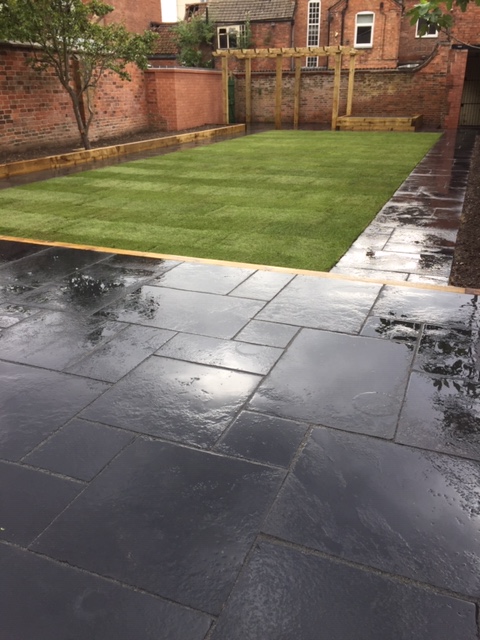When you’ve invested in beautiful new paving, whether it’s a patio, pathway, or driveway, you naturally want it to look its best and last for years. Paving is a significant purchase, and ensuring that it’s well-protected is crucial to preserving both its appearance and functionality. One question many homeowners ask is: does paving need sealing? In this guide, we’ll explore the benefits and potential drawbacks of sealing, helping you make an informed decision.
Sealing your paving can be a worthwhile investment, particularly if you’ve chosen porous materials like natural stone. It helps protect your paving from the elements, enhances its appearance, and can even extend its lifespan.
However, not all paving requires sealing, and it’s important to weigh up the pros and cons before deciding. If you’re unsure whether sealing is right for your paving, consider the specific materials you’ve chosen and the conditions they’ll face year-round.
Why Consider Sealing Your Paving?
Sealing your paving can offer several advantages, especially when you’ve chosen premium materials like natural stone. However, it’s not always necessary, and there are some factors to weigh up before making your decision.
Protection and Longevity
One of the main reasons to seal your paving is to protect it from the elements. Whether it’s rain, frost, or sunlight, outdoor paving is exposed to the full force of weather conditions year-round. Sealing can create a protective barrier against moisture, which helps prevent cracking, erosion, and discolouration over time.
Aesthetic Appeal
If you want your paving to maintain its natural beauty, sealing can help preserve its original colour and finish. This is particularly important for lighter stones that are prone to staining or fading. Sealing also adds a slight sheen, giving your paving a refreshed look.
The Pros and Cons of Sealing Paving
| Pros | Cons |
|---|---|
| Protects against moisture and staining | Requires reapplication every few years |
| Enhances the colour and finish | Can be costly, especially for large areas |
| Helps prevent weed growth in joints | Not all stones need sealing |
| Increases durability in harsh weather | May alter the natural look of some materials |
What Types of Paving Benefit Most from Sealing?
Not all paving materials need sealing. Some are naturally more resistant to the elements, while others, particularly porous stones, can greatly benefit from an added layer of protection.
- Natural Stone: Sandstone, limestone, and slate are porous and prone to water absorption. Sealing helps maintain their integrity and prevents stains from settling into the stone. Premium Indian stones like Red Modak, Kandla Grey, and Rainbow Sandstone particularly benefit from sealing due to their natural composition.
- Concrete Paving: While not always necessary, sealing concrete paving can help enhance its appearance and protect it from wear and tear.
- Porcelain Paving: Typically, porcelain is non-porous and doesn’t need sealing, though sealing the grout between the tiles is often a good idea.
How Often Should You Reseal Paving?
Sealing isn’t a one-time job; it needs reapplication to remain effective. Depending on the type of paving and the sealant used, you’ll need to reseal every 2-4 years. Always check the manufacturer’s recommendations for the specific sealant you choose.
Does Sealing Help Prevent Weeds?
Sealing your paving can help reduce weed growth, particularly in the joints between slabs. By creating a smoother surface and filling small gaps where seeds might otherwise settle, a sealant makes it harder for weeds to take root. However, sealing is not a foolproof solution, and regular maintenance will still be required to keep weeds at bay.
FAQs
How long does paving sealant last?
Most sealants last between 2-4 years before requiring reapplication, depending on the level of exposure to the elements and foot traffic.
Does sealing change the appearance of my paving?
Sealing often enhances the colour and gives the surface a slight sheen, but it can also darken the stone slightly. Some people prefer this enhanced look, while others prefer the natural, unsealed finish.
Can I seal my paving in the winter?
It’s best to avoid sealing during the winter months or on very cold days, as the sealant may not set properly. If you’re considering laying paving in the winter, check out our post on how to lay paving in the winter for more tips.
Is sealing paving expensive?
The cost of sealing varies depending on the size of the area and the type of sealant you use. While it is an added expense, it can save money in the long run by reducing damage and the need for future repairs.
For more information on paving materials like Indian sandstone, explore our full range of indian sandstone paving to ensure you make the best decision for your outdoor space.

